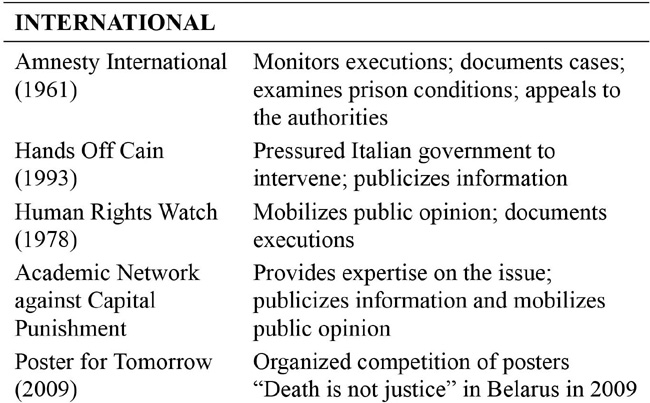Transnational Networks and Norm Compliance: Stopping Executions in Belarus
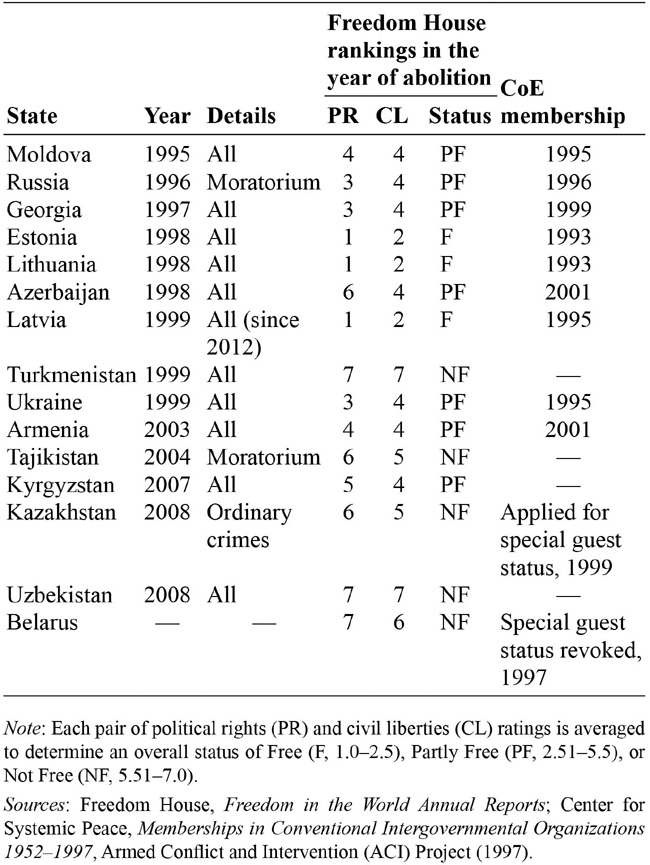
Chapter 11
Transnational Networks and Norm Compliance: Stopping Executions in Belarus
Volha Charnysh
Introduction
A real momentum to end the death penalty is gathering around the world. More than two-thirds of states have abolished it in law or practice, only 21 states carried out executions in 2010 (Amnesty International [AI], 2011). Europe, where the death penalty is a pressing human rights issue, has been the leader of the abolition movement. Its most notable success is in the post-Soviet region. By 2008, Armenia, Azerbaijan, Georgia, Kyrgyzstan, Moldova, Turkmenistan, Ukraine and Uzbekistan abolished the death penalty; Tajikistan, Russia, and Kazakhstan imposed moratoria on executions. The region is death penalty-free with the exception of one state – Belarus. As many as 400 people have been executed in Belarus since 1991 (AI, 2009b), with the latest execution in March 2012.
Belarus stipulated the provisional character of the punishment in the 1994 Constitution, enjoys a moderate crime rate, is ethnically homogeneous and stable, and was promised Council of Europe (CoE) membership and rapprochement with the European Union (EU) for abolishing the death penalty. Yet years of efforts by domestic and international non-governmental organizations (NGOs), human rights defenders, and the EU, the CoE, the Organization for Security and Co-operation in Europe (OSCE) and the United Nations (UN) have not convinced Minsk to stop executions. This chapter attempts to explain why the abolition effort failed.
Understanding the Belarusian case is important because the norm compliance literature over-emphasizes successes, creating a bias in favour of norms that work and states that comply (Kowert and Legro, 1996, 485). While the death penalty norm has triumphed in Europe and the former Soviet Union (FSU), explaining the singular case of Belarus’s non-compliance could help understand the limits of transnational influence in other parts of the world. Furthermore, a small economically weak Belarus offers a good test for norm socialization theories because of the salience of the norm against the death penalty in Europe and the size and strength of the transnational network pushing for abolition.
In this chapter, I first evaluate the strength of the norm pressure and the transnational abolition effort, and then explore two potential explanations for their failure. I argue that the failure of the abolition effort in Belarus is a consequence of the weak European linkage and leverage in Belarus, and in particular of the deliberate European policy of isolation. I show that the EU’s tendency to connect rewards to performance on several human rights and political issues at once increases the costs of Belarus’s compliance.
The Strength of the Norm against the Death Penalty
The strength of the norm against the death penalty is crucial for the success of norm socialization (Thomas, 2001). Belarus’s executions contradict the norm that has taken hold in an astonishing number of states and is enshrined in several international treaties, including the International Covenant on Civil and Political Rights (ICCPR) and the Second Optional Protocol to the ICCPR, endorsed by 72 states as of December 2010. Abolition of the death penalty is seen as a requirement for entry to the EU and the CoE, and is stipulated in the two protocols of the European Convention for the Protection of Human Rights and Fundamental Freedoms (ECHR) as well as the EU Charter of Fundamental Rights. In 2007, the European Parliament, the EU presidency, the European Commission, and the CoE signed a Joint Declaration in order to promote universal abolition.
The death penalty in Belarus arguably violates other human rights, including ‘the right to be free of excessive, repressive and tortuous punishments’ (Hood and Hoyle, 2008, 19). Executions in Belarus are also criticized because of their secrecy, the abusive detention system and the flawed justice mechanisms (CoE, 1999, 7; Viasna, 2006; Amnesty International, 2009a) which entail violation of the legal standards of the UN Committee against Torture, the UN Human Rights Committee (UNHRC), the UN Economic and Social Council, the CoE and Belarus’s OSCE commitments.1
In the case of Belarus, the norm pressure is also strengthened by the phenomenon of regional clustering (Simmons, 2009, 18, 89, 91–6). If in the early 1990s Belarus was a typical post-Soviet state executing its criminals, by 2008 it has become the only executioner in the region, and began to face much stronger criticism.
Simmons (2009) shows that an explicit public treaty commitment by the target state strengthens the norm and can be employed strategically by transnational actors. Belarus has signed two international treaties related to the death penalty: the ICCPR, seeking to limit the death penalty where it is still applied, and the Convention on the Rights of the Child, prohibiting the death penalty for juveniles and children. In addition, Belarus ratified the UN Convention Against Torture and Other Cruel, Inhuman or Degrading Treatment or Punishment (CAT). Belarus is obligated to abolish the death penalty by its own constitution (1994) and Criminal Code (1999), both of which see the penalty as temporary. At the same time, Belarus has not joined the Second Optional Protocol to the ICCPR, which explicitly prohibits the death penalty.
Warr (1995) argues that norms have more impact if they accord with the pre-existing social understanding. Indeed, leaders who retain executions refer to public opinion, even in undemocratic states like Belarus.2 Nevertheless, in most states, the punishment was abolished despite its popularity among the public (Garland, 1990, 246).
In short, the norm against the death penalty in Europe is strong, which is acknowledged even by Belarusian officials, who concede the pre-eminence of the norm in Europe even as they explain why executions in Minsk continue.
The Transnational Network Operating in Belarus
The strength of the transnational network seeking abolition is determined by the availability of resources, support by national governments and inter-governmental institutions, and strong links to domestic civil society in the target state (Risse, 2000, 204–5). All of these factors are present in the Belarusian case. The normative pressure on Minsk comes from international and Belarusian NGOs, individual national governments, the CoE, the EU, the OSCE and the UN (see Table 11.1).
The key role is played by Amnesty International, which has campaigned against the death penalty in the region since the 1970s. AI published several reports on Belarus and initiated a capacity-building effort aimed at Belarusian civic activism on the death penalty. In 2008, AI held a seminar on campaigning against the death penalty in Ukraine (because AI and the invited NGOs were not registered in Belarus; McGill, personal communication). AI works directly on individual cases, participates in high-level lobbying, and has developed a ‘close working relationship with the CoE’ (Jung, personal communication).
The death penalty in Belarus has also been taken up by the international NGO Hands Off Cain and by NGOs in Poland and Lithuania, which have large Belarusian diasporas and many organizations dedicated to human rights violations in Belarus, as well as in other countries.
The domestic civil society organizations in Belarus, which have more traditionally focused on freedom of expression and assembly, became actively involved in the abolition of the death penalty because they saw it ‘as a less political issue’ that could ‘unite civil society’ (McGill and Jung, personal communications3). The leading domestic organizations campaigning for abolition are Viasna and the Belarus Helsinki Committee (BHC). These organizations increase public awareness by mobilizing the media and public opinion, gather first-hand evidence in specific cases, and help appeal cases to the UN bodies.4 They also send open letters to the president asking for pardons (Viasna, 2009). Human rights activists stage pickets outside the Presidential Administration in Minsk and around the country, and are often detained and fined (Viasna, 2009; Viasna, 2010). The domestic civil society organizations also appeal to public figures to petition the authorities.5
Table 11.1 Transnational network for the abolition of the death penalty in Belarus
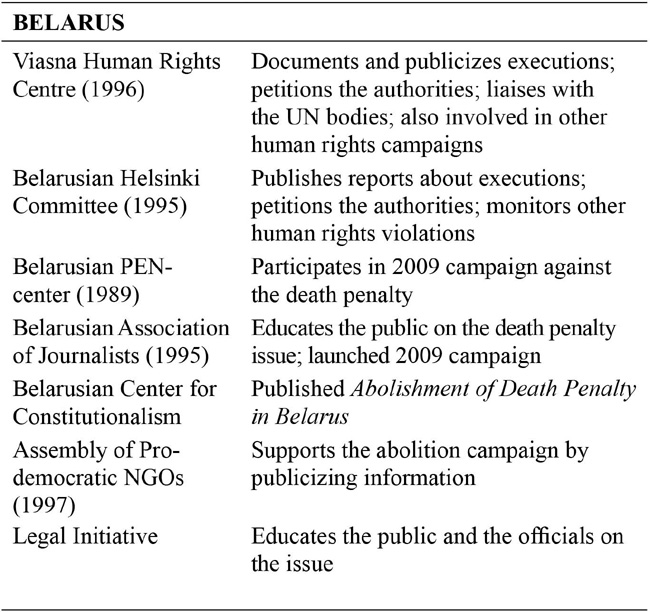
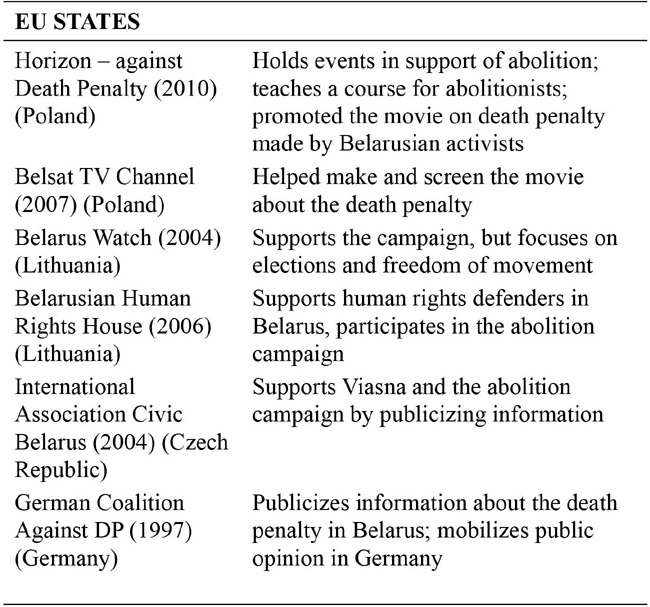
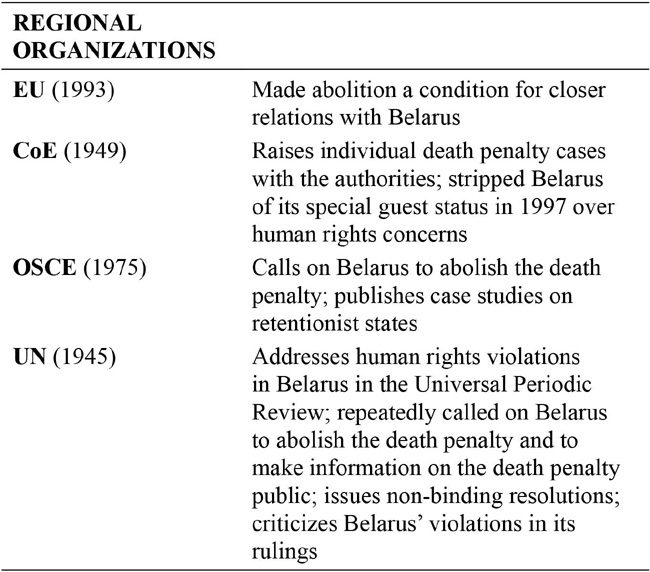
In co-operation with CoE, the Belarusian Center for Constitutionalism and the Belarusian organization Legal Initiative (Pravovaia Iniciativa) have published over thirty books on Belarus’s legal system and its human rights record, including several volumes on the abolition of the death penalty in Belarus (for example, Filippov and Vashkevich 2003; Filippov and Vashkevich, 2007).
In January 2009, a new campaign, Human Rights Activists against the Death Penalty campaign was launched by activists from Viasna, BHC, the Belarusian PEN-center, the Union of Belarusian Writers and the Belarusian Association of Journalists (BAJ). In Belarus, the campaign was also supported by the Belarusian Social Democratic Party, the United Civil Party, the Young Democrats, and the Civil Forum. The activists informed the people about executions in Belarus, submitted a petition to the authorities, and organized a contest of creative works on the issue.6 The campaign was chosen as the civil campaign of the year by the Belarusian Assembly of Pro-democratic NGOs in December 2009.
The efforts of domestic and transnational activists suffer from the ‘rigid and hostile political environment’ in Belarus (Expert Council on NGO Law of the Council of Europe, 2009). As of January 2009, there were only 0.2 officially registered NGOs per 1,000 Belarusians (the average in Europe is four; Sahm, 2009, 51). NGOs face obstacles when trying to register, and any activity on behalf of non-registered NGOs is a criminal offence under Article 193-1 of the Criminal Code. Those organizations that do pass the registration process cannot carry out their activities freely because of strict supervision by the government. Even AI was denied registration in Belarus. Viasna also operates without registration; its request has been denied three times for politically motivated reasons.7 The problem is exacerbated by the fact that most organizations campaigning for abolition are also interested in the broader issues of human rights and democratic freedoms, which increases the likelihood of state persecution.
The norm against the death penalty has mobilized a vibrant transnational network that includes not only civil society actors, but also the EU, the CoE, the UN and the OSCE.
In the Guidelines to EU Policy towards Third Countries on the Death Penalty adopted in 1998, the EU vowed to ‘work towards the abolition of the death penalty as a strongly held policy view agreed by all EU member states’ (Council of the EU, 1998). During 1994–2007, the EU allocated more than 11 million euros for civil society projects aimed at raising public awareness, conducting studies, training lawyers and securing access to legal support for death row inmates (Europa, 2007). The last executioner in Europe, Belarus bears the brunt of the EU’s efforts, and is censured and sanctioned on a regular basis.
The UN Committee against Torture, the UN Human Rights Committee, and the UN Third Committee also criticize executions in Belarus. In addition to condemnation, the UN adopts non-binding resolutions, investigates human rights violations, and reviews appeals from the relatives and lawyers of people on death row. In September 2010, the UN Human Rights Council adopted the Universal Periodic Review outcome on Belarus, in which 14 states raised concerns about the death penalty in Belarus.
The Committee of Ministers of the CoE and the Parliamentary Assembly of the Council of Europe (PACE) are the strongest crusaders against the death penalty. In 1995, PACE made abolition a precondition for joining the CoE, which led to a wave of policy changes in the post-Soviet countries. Belarus was stripped of its CoE special guest status in 1997 over human rights concerns. PACE indicated readiness to restore it for the first time only in 2009, pending ‘substantive and irreversible progress towards Council of Europe standards’, particularly in regard to the electoral process, respect for political freedom and media pluralism, and the death penalty (Hurskainen, 2009). The CoE raises death penalty issues with Belarusian authorities year after year, making clear that ‘Belarus could never hope to be considered for CoE membership as long as it maintains these brutal punishments’ (CoE Secretary General Walter Shwimmer, quoted in AI, 2004). Belarusian human rights groups have identified the CoE’s influence as central (Viasna, 2002), and so have Belarusian officials, who have dubbed the death penalty ‘a CoE rule’.
The OSCE has also consistently called on Belarus to abolish the death penalty. Since 1999, the OSCE has prepared an annual background paper, The Death Penalty in the OSCE Area, asking the Belarusian authorities to answer a questionnaire on the issue.
Norm Socialization Mechanisms
In the end, even strong norm pressure and a robust network of actors seeking to induce compliance leave the decision to comply with the target state. Most theoretical explanations on norm compliance follow either a rationalist or a constructivist logic. The former focuses on cost–benefit calculations, material reinforcement and coercion (for example, Wagner, 1998). According to rationalist logic, transnational pressure changes the cost–benefit analysis of a target state; the constructivist approach emphasizes learning and persuasion (Adler, 1997; Ruggie, 1998), and explains compliance as a change in preferences through learning and interaction (Finnemore and Sikkink, 1998; Price, 1998).
Checkel (2005, 804) bridges the constructivist and rationalist mechanisms by distinguishing between Type I and Type II norm socialization. In Type I socialization, norms are not internalized, and actors engage in cost–benefit analysis and/or role-playing; this type is consistent with rationalist bargaining explanations and the constructivist mechanism of social protest/mobilization. Type II socialization implies norm internalization, and occurs by a more involved mechanism of ‘normative suasion’ (Checkel, 2005, 804).8 Similarly, Simmons (2009, 58) divides states into sincere ratifiers, false negatives (which are committed in principle, but fail to ratify) and strategic ratifiers (which ratify for immediate rewards or to avoid criticism). Sincere ratifiers result from Type II socialization via normative suasion; strategic ratifiers result from Type I socialization that changes the costs/benefits of compliance and/or leads to compliance via exposure and communication; false negatives occur at the intersection of the two mechanisms: when the costs of norm adoption are high (for example, when complex changes to legislation are involved), but normative suasion has succeeded.
Type II socialization that results from normative suasion usually comes after Type I socialization has already occurred (Checkel, 2005). Therefore, this chapter does not address Type II socialization in the case study of Belarus, where Type I socialization failed. The features of the two other norm socialization mechanisms are explained below.
Strategic Calculation and Conditionality
If a state’s leadership is not committed to the norm due to deeply held beliefs, it may engage in cost–benefit calculations when considering whether to comply. In this case, reinforcement rather than persuasion could lead to a behavioural change (Schimmelfennig, 2005b, 107). This approach is taken by the scholars of political conditionality (who tend to emphasize inter-governmental channels) and by the scholars who explore the changes in states’ utility calculations resulting from transnational norm pressure (for example, Kelley, 2004; Finnemore and Sikkink, 1998). In particular, Schimmelfennig argues that the effectiveness of conditionality depends on the size of international rewards versus domestic norm adoption costs, and the credibility of conditionality. Cost–benefit calculations can be changed by material or social reinforcement (Schimmelfennig, 2005b, 108–9). The more the norms ‘affect the security and integrity of the state, the government’s power base, and its core political practices of power preservation’, the more the costs grow (Schimmelfennig, 2005a, 3). The highest costs are those of adopting liberal norms, which ‘limit the autonomy of governments and prohibit the use of certain instruments to preserve their power’ (Schimmelfennig, 2005, 111). This is why liberal norm compliance by undemocratic states is only possible when the costs of compliance are offset by major external gains that come from NATO and EU membership (Schimmelfennig, 2005a, 6).
From Role-playing to Linkage and Leverage Mechanisms
Norm socialization often involves more than getting the incentives and disincentives right. According to Checkel (2000, 19), the very process of social interaction within international organizations can promote state compliance by means of ‘policy dialogues, jawboning, learning, persuasion’. Compliance via role-playing works through ‘prolonged exposure and communication’. The result is that the target actors adopt roles ‘because it is easier socially, as opposed to only and always acting strategically and instrumentally’ (Checkel, 2005, 810–11).
Importantly, institutional contact may be much more likely to lead to norm socialization when combined with contact in other areas and strengthened by the high leverage of the socializing agent. In particular, Way and Levitsky (2007) argue that the differences along the dimensions of linkage and leverage are crucial for explaining why democratization succeeds in some post-Communist states but not in others, and I extend their argument to explain the socialization of European norms like the norm against the death penalty in the FSU.
Way and Levitsky define Western leverage as ‘governments’ vulnerability to external democratizing pressure’ (Way and Levitsky, 2007, 50). Leverage raises the cost of building and maintaining an authoritarian regime (Way and Levitsky, 2007, 51). Leverage rarely leads to effective democratization unless it is combined with linkage, conceptualized as ‘the density of ties (economic, geographic, political, diplomatic, social, and organizational) and cross-border flows (of capital, goods and services, people, and information)’ between a target state and the USA, the EU and Western-dominated institutions (Way and Levitsky, 2007, 53). Strong linkage makes the regime’s abuses known to the international community, increases the probability of a Western response, creates domestic actors interested in good relations with the West, and when ‘combined with leverage reshapes the domestic balance of power within authoritarian regimes’ (Way and Levitsky, 2007, 60). In contrast, weak linkage limits constraints on autocratic governments, undermines Western influence in the country, and undercuts ‘the development of a powerful domestic constituency for democracy and good relations with the West’ (Ekiert, Kubik and Vachudova, 2007, 25). Linkage encompasses contact, seen by Checkel as crucial for socialization via role playing. In combination with leverage, linkage seems more appropriate for explaining norm compliance in the post-Soviet region. It is notable that the states that abolished the death penalty earliest and under the least pressure were those located closest to and with the greatest economic and social ties with Western Europe (Fawn, 2001, 72).
Abolishing the Death Penalty in Belarus: One Step Forward, Two Steps Back
The Criminal Code of Belarus (1999) provides for capital punishment for 12 offences during peacetime and an additional two offences during wartime, and specifies the temporary nature of capital punishment.9 A person sentenced to death has the right to appeal to the Supreme Court, and then to petition the Presidential Commission for a pardon (Article 84.19 of the Constitution). Executions take place in the Minsk Isolator by shooting, usually approximately a year after sentencing.
Reading Belarusian headlines, one gains an impression that a moratorium is just around the corner.10 Indeed, since 1991, the legal system has been liberalized and the 1961 Soviet Criminal Code has been amended. In 1993, the death penalty was abolished for four types of economic crimes; in 1997, life imprisonment was introduced (but terrorism was added to the list of crimes attracting the death penalty). However, these developments cannot be attributed to transnational pressure and do not signify a serious commitment to end executions. Progress slowed in the 2000s, and the death penalty was not even mentioned in the 2010 ‘Concepts for Improving the System of Criminal Prosecution’ (Lukashenka, 2010).
Giving in to transnational pressure, the Belarusian Parliament held a hearing on the death penalty in May 2002. Although the majority opposed the abolition of the death penalty or the introduction of a moratorium, the National Assembly (2002) issued a series of recommendations on how to further the decision on the issue. Acting on the recommendations, in March 2004 the Constitutional Court reviewed the application of death penalty and concluded that the constitution allows ‘the president or the parliament’ to declare a moratorium or abolish the death penalty. The court said that the results of the 1996 referendum, in which 80.44 per cent of Belarusians voted in favour of retaining the penalty, was only of an advisory nature, and pointed out the lack of factual basis for the relationship between the crime rate and the presence of the capital punishment (Constitutional Court of the Republic of Belarus, 2004).
At the same time, the Belarusian authorities have openly resented the norm pressure. For years, Minsk denied the UN Commission on Human Rights Special Rapporteur on Belarus access to the country, refused to follow the recommendations of the UN Human Rights Committee on the treatment of convicts’ relatives, ignored AI’s requests for statistics on executions, turned down meetings, and punished activists with detentions and fines (Viasna, 2007; Viasna, 2009; Viasna, 2010). The very timing of sentences and executions is telling. In 2009, a death sentence was passed less than a week after PACE voted to restore Belarus’s special guest status, and two more death sentences were passed two days after a UN Universal Periodic Review Working Group criticized the May 2010 executions.
Belarusian officials are dismissive of the pressure from the civil society, and only slightly more cognizant of the CoE’s and EU’s requests.11 Although they feel the need to explain that they are not ‘cruel’ (ITAR-TASS, 11 April 1998, cited in Fawn, 2001), transnational demands often only strengthen the authorities’ desire not to give in to the West. The official line is that if the death penalty is ever abolished in Belarus, it will not be because of European requests, but because domestic public opinion has changed (Konstantinov, 2009). The president says that although ‘Europe insists’, he cannot ‘go against the will of the people’ who voted against abolition in a referendum.12
